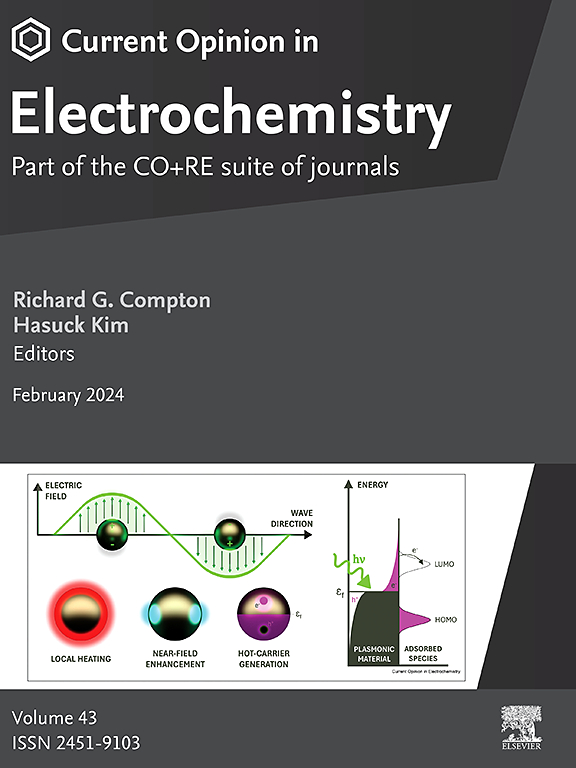Determination of the reaction orders for electrode reactions
IF 7.9
2区 化学
Q1 CHEMISTRY, PHYSICAL
引用次数: 0
Abstract
Information of reaction orders is prerequisite in unveiling the mechanism(s) of complex electrocatalytic reactions, which is of great help in benchmarking the intrinsic electrocatalytic performance and in establishing the structure–activity relationship. However, electrochemical reaction orders for only few electrocatalytic reactions have hitherto been unambiguously quantified, due to the complexities of the reaction themselves and the complexities of interfacial environments. The apparent reaction orders may depend on the coverage of the adsorbed reactant, reactive intermediates at the electrode interface, their adsorption behavior, the occurrence of parallel pathways as well as existence pre or postchemical reactions. In this short review, theories and methods used for determination of the reaction orders for electrode reactions are summarized and exemplified by taking hydrogen evolution/oxidation reaction (HER/HOR) and oxygen reduction reaction (ORR) under rotating disk electrode configuration as model reactions. Frequently encountered challenges in accurate determination the reaction orders for complex electrocatalytic reactions are discussed.
确定电极反应的反应顺序
反应阶次信息是揭示复杂电催化反应机理的先决条件,对确定内在电催化性能基准和建立结构-活性关系大有帮助。然而,由于反应本身的复杂性和界面环境的复杂性,迄今为止只有少数电催化反应的电化学反应阶次被明确量化。表观反应阶次可能取决于吸附反应物的覆盖范围、电极界面上的反应中间体、它们的吸附行为、平行途径的发生以及前化学反应或后化学反应的存在。在这篇简短的综述中,以旋转盘电极构型下的氢进化/氧化反应(HER/HOR)和氧还原反应(ORR)为模型反应,总结并举例说明了用于确定电极反应阶次的理论和方法。讨论了在准确确定复杂电催化反应的反应阶次时经常遇到的挑战。
本文章由计算机程序翻译,如有差异,请以英文原文为准。
求助全文
约1分钟内获得全文
求助全文
来源期刊

Current Opinion in Electrochemistry
Chemistry-Analytical Chemistry
CiteScore
14.00
自引率
5.90%
发文量
272
审稿时长
73 days
期刊介绍:
The development of the Current Opinion journals stemmed from the acknowledgment of the growing challenge for specialists to stay abreast of the expanding volume of information within their field. In Current Opinion in Electrochemistry, they help the reader by providing in a systematic manner:
1.The views of experts on current advances in electrochemistry in a clear and readable form.
2.Evaluations of the most interesting papers, annotated by experts, from the great wealth of original publications.
In the realm of electrochemistry, the subject is divided into 12 themed sections, with each section undergoing an annual review cycle:
• Bioelectrochemistry • Electrocatalysis • Electrochemical Materials and Engineering • Energy Storage: Batteries and Supercapacitors • Energy Transformation • Environmental Electrochemistry • Fundamental & Theoretical Electrochemistry • Innovative Methods in Electrochemistry • Organic & Molecular Electrochemistry • Physical & Nano-Electrochemistry • Sensors & Bio-sensors •
 求助内容:
求助内容: 应助结果提醒方式:
应助结果提醒方式:


